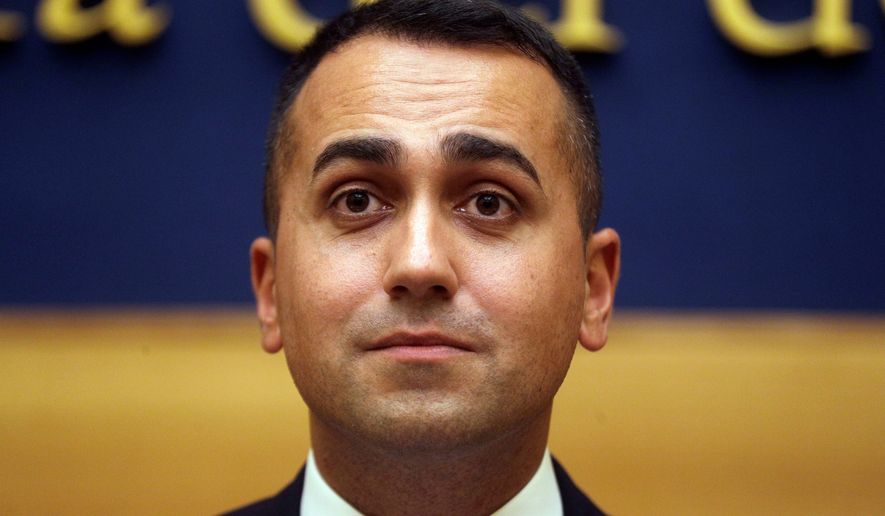ROME | Italy’s youngest-ever minister of foreign affairs did not take a traditional path to one of the Italian government’s most high-profile jobs. But barely more than a week into his new job, 33-year-old Luigi Di Maio is already surprising a few of his critics.
Mr. Di Maio, head of Italy’s populist 5-Star Movement, was deputy prime minister and economic development minister for nearly 15 months under Prime Minister Giuseppe Conte. In the new government, sworn in Sept. 5, Mr. Di Maio was tapped as foreign minister — a choice that raised eyebrows in Italy and elsewhere in Europe.
After a period of strain with Italy’s European partners over issues ranging from government spending to immigration policy, most of Mr. Conte’s early appointments have earned praise from political analysts and Italy watchers. A respected former prime minister is now Rome’s representative on the European Commission; a pro-European economist serves as finance minister; an experienced technocrat oversees Italy’s immigration policies; and a popular former culture minister has returned to the job he held for four years.
Mr. Di Maio, however, was the exception. The choice has been questioned on Italian news sites and panned on social media.
In Italy, the foreign minister job usually goes to a former diplomat, or to someone who has cultivated relationship with foreign leaders through work with multilateral organizations or a European Union entity. Going back decades, Italy’s previous foreign ministers traditionally have been highly educated, and fluent in multiple languages.
Mr. Di Maio, by contrast, never graduated from college and struggles with foreign languages. The native of Naples lived with his parents until a few years ago, while earning money hawking drinks at hometown soccer games.
Mr. Di Maio’s most high-profile foray into foreign policy as an official in the previous government — an alliance of the 5-Star Movement and the euro-skeptic, anti-migrant League party — was to side with anti-government “yellow vest” protest movement in France, a move that prompted the Paris to withdraw its ambassador to Rome for the first time since the 1940s — when France and Italy were on opposite sides of World War II.
When he was sworn in Sept. 5, Mr. Di Maio was about a month younger than Galeazzo Ciano, an Italian aristocrat, war hero, former ambassador, and son-in-law to then-Italian leader Benito Mussolini. In 1936, Mussolini named Ciano Italy’s minister of foreign affairs, a job he held until 1943, when he met his end in front of a firing squad. Before Mr. Di Maio, Ciano had been the youngest foreign minister since modern Italy was unified in 1861.
But despite Mr. Di Maio’s atypical pedigree, some here say there are reasons for optimism about his upcoming tenure.
“Di Maio is part of a new generation of political figures,” said Andrea Carteny, an international relations professor at Rome’s La Sapienza University. “He doesn’t have a typical background, but he makes up for a lack of experience with savvy and enthusiasm.”
Mr. Carteny noted that Mr. Di Maio skillfully guided the 5-Star Movement, a party barely a decade old that had never before been in government, through the baffling government crisis last month sparked by its former coalition partner, the League.
The League’s hard-charging leader, former Interior Minister Matteo Salvini, was widely believed to have engineered the previous government’s downfall on the expectation that he would emerge as the head of the next government. Instead, the 5-Star Movement linked up with the center-left Democrats, leaving Mr. Salvini and his party out of power.
Matteo Bressan, an international relations specialist at Lumsa University in Rome, said in an interview that Mr. Di Maio’s selection of Ettore Francesco Sequi, Italy’s more recent ambassador to China, at his top adviser was “a very smart move.”
“Remember that being foreign minister does not mean a person has to know everything about everything,” Mr. Bressan said. “It means they have to be able to surround themselves with the right people and make good judgment calls. So far at least, Di Maio has proved he can do that.”
A summit of EU foreign ministers on Oct. 14 in Luxembourg will likely be Mr. Di Maio’s coming-out party in his new role. Ministry sources say Mr. Di Maio will be ready to represent Italy’s foreign policy priorities — even if it is with the help of a translator.




Please read our comment policy before commenting.